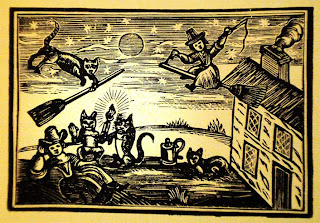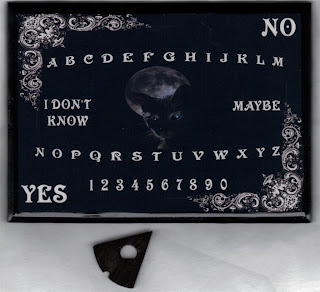Halloween is a time of ghosts, goblins and black cats. If you own a black cat, I would recommend keeping it indoors until the holiday is over. Even today, black felines have a persistantly fearsome reputation for bad luck and witchcraft, giving some disturbed individuals an excuse to harm them. Black cats were not always so maligned however.
Oagans-Bast was the sacred black cat god popular in the monotheistic religion of ancient Egypt. All cats, but especially black cats, were held sacred and kept in Egyptian homes for protection, fertility and luck. It was believed the god's spirit would enter the cat, and bless its family with prosperity. Killing any cat in ancient Egypt, even accidentally, would result in your death as well.
This all changed during the Middle Ages. The black cat became associated with witches, and as a consequence were destroyed in hideous ways. Witches were believed to transmutate into a cat nine times during their life. In Hungry, cats in general were assumed to become witches between the ages of seven and twelve. To avoid this fate, crosses were cut into the cat's skin. The thirteenth century pope Gregory IX declared the Cathars (a heretical religious sect) bred black cats because the animals were the devil in disguise. A holy war against the Cathars was declared shortly after the Pope's announcement.
Elizabeth the First
At the coronation of Elizabeth the I of England in 1558, Protestants carried a cat filled wicker dummy of the pope through the streets, ultimately tossing the terrified creatures into a massive bonfire. If I were Elizabeth, I'd be worried about death looking over my shoulder too.
Author: Edward Topsell
In the seventeenth century it was thought various bits and pieces of black cats could cure illnesses. People wishing to avoid sickness often buried the tail of a black cat under the doorstep of their homes. English naturalist Edward Topsell proscribed blowing the ashes of a black cat's burned head into painful or blind eyes three times a day.
There is good news though. Buddhists consider all cats lucky, including the black ones. The Buddhists say if a black cat enters your home, and you treat it nicely, good luck will come your way. Also, if a black cat should cross your path, and doesn't harm you, luck is yours.
King Charles the First
Artist: Anthony Van Dyck
Charles the I of England had a black cat he took everywhere. Believing the cat good luck, he was devastated when the cat died suddenly, and expected the worst. The very next day, Charles was arrested and ultimately beheaded.
More recently, black cats have appeared in literature, including "The Black Cat" by Edgar Allan Poe. To read the story, click HERE. Other stories including black cats are "A Cat's Tail" by Mark Twain; "The Cat and the Moon" by William Butler Yeats; and "Mulliner Nights" by P.G. Wodehouse.
Some businesses use black cats in their logos. They include Eveready Batteries, and Ritz-Lanvin's "My Sin" perfume.
"My Sin" perfume.
I have no idea what this smells like, but the bottle is nice. Since cats are often associated with sensually, and the woman is portrayed with offspring, I'm not sure what they're trying to say. If you use "My Sin," you'll have numerous illegitimate children perhaps.
A black cat game!
A board game by Parker Brothers called The Black Cat Fortune Telling Game was released in 1897. This looks like a more recent edition.
So I hope you and your cat, black or otherwise, celebrate this Halloween safely. Maybe a black cat will enter your home. That's good luck in Yorkshire, England you know.












.png)












